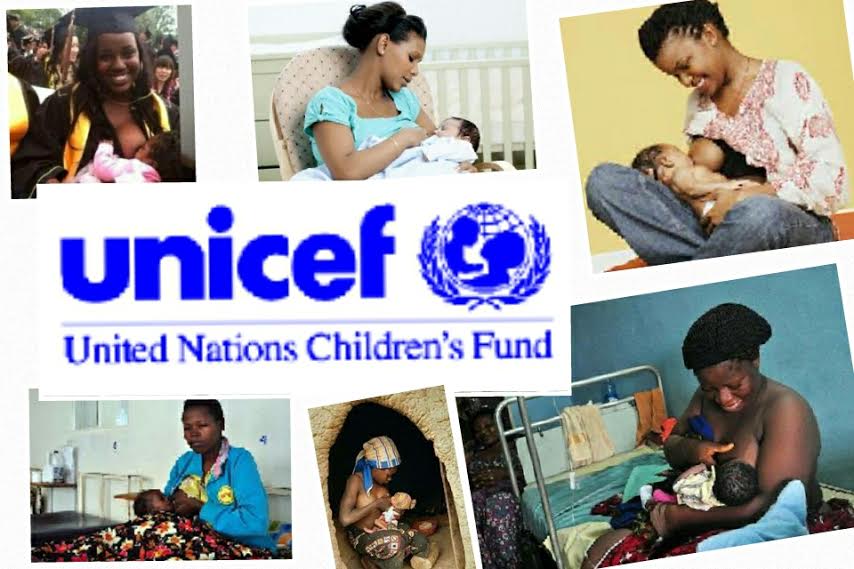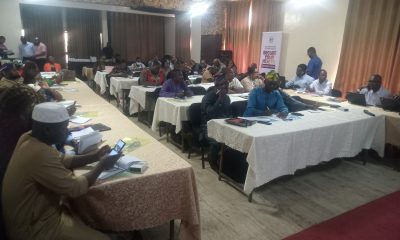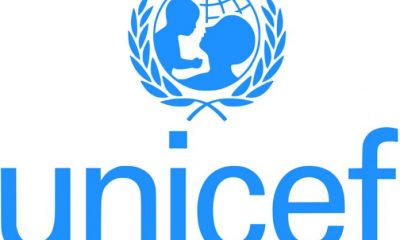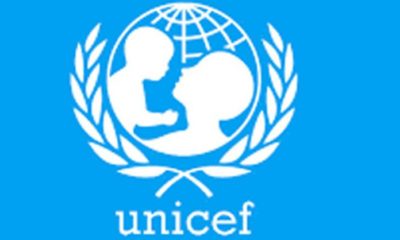News
‘Babies who are Exclusively Breastfeed for the First 6 Months Have Lower Risk of Respiratory Infection’-UNICEF

By Segun Ojo
The European Union (EU) and United Nation Children Fund (UNICEF) have charged the nursing mothers to give priority to the exclusive breast feeding of their children especially in the first six months.
A Nutritionist of the UNICEF, Ondo state Field Office, Mrs Ada Ezeogu, gave the charge in a press statement issued and make available to CityMirrorNews to mark this year World Breastfeeding Week.
Ezeogu who described exclusive breastfeeding as a cornerstone of care for childhood development, said a responsible mother should give precedence to adequate breast feeding of their children so as to provide antibodies that help baby fight off infection.
Speaking on the theme” Breast Feeding: A Key to Sustainable Development” Ezeogu said findings have shown that majority of nursing mothers did not give priority to exclusive breast feeding, hence, there is need for adequate sensitization on its significance.
Ezeogu said “Breast feeding especially exclusive breastfeeding is a win-win for all – baby, mother, family and society. It improves the survival, health, and development of all children. It saves women’s lives and contributes to human capital development. These benefits are irrespective of where you live and your economic status.”
“Breast milk contains the entire nutrient that an infant needs for the first six months of life. It also contains antibodies that help the baby fight off infection. Breastfeeding lowers the baby’s risk to allergies such as asthma”.
“Babies who are exclusively breastfeed for the first 6 months of their lives have lower risk of respiratory infection, sudden infant death syndrome and fewer bouts of diarrhea.”
The Nutrition Specialist further explained that breastfeeding protects the babies from adult on set of chronic diseases such as obesity and diabetes mellitus, adding that it reduces ill health in children, improves their educational potential and probably their earnings as adults.
“Mothers are expected to put the baby to the breast within 30minuties of delivery and to give the baby the first milk which is known as colostrum. This milk is thick and yellow, rich in antibodies and vitamin A which protect the baby against allergy and infection.”
Explaining the benefits of breastfeeding for the mother, Ezeogu said it help in protecting breast and ovarian cancers as well as against hip fracture later in life and postmenopausal cardiovascular disease.
Ezeogu asserted that the longer mothers breastfeed, the greater their protection against breast and ovarian cancer, and hip fractures.
Educating mothers on best positions for breastfeeding babies, Ezeogu explained that the baby’s body should be straight, not bent or twisted, but with the head slightly back and the baby should be closed to mother.
Ezeogu further explained that the baby’s body must be facing the breast not held flat to the chest or abdomen, and baby should be able to look up into mother’s face
She therefore appealed to mothers to breastfeed for up to two years and beyond with addition of complementary foods from the 6th month, saying it helps to bring about bonding of baby and mother and averts delays a new pregnancy.
While talking on the percentage of women who practice exclusive breastfeeding, Ezeogu said the rate with which women breastfeed was very low especially among Nigerian mothers.
“Exclusive breastfeeding rate is persistently low among mothers in Nigeria with the National rate at 25% in 2014 (National Nutrition and Health Survey, 2014).
This rate according to Ezeogu are varies across the geopolitical zones with the lowest rate in the North West at 10% and highest rate in the South West at 39%. She added that the rates in other regions are South East 18%, North East 22%, South South 31%, and North Central 32%.
This year World breastfeeding weeks commences between Monday 1st and Sunday 7th August, 2016.
-

 News4 days ago
News4 days agoUpdated: Oyo Police Parade Arrested Yoruba Nation Agitators
-

 News3 days ago
News3 days agoJust In: Adeleke Appoints Former Osun Commissioner For Finance, Bolorunduro Chairman Of Living Trust Mortgage Bank
-

 News5 days ago
News5 days ago‘21 Chibok Girls Return With 34 Kids; 48 Parents Die Of Trauma’
-

 News2 days ago
News2 days agoBreaking: JAMB Directs CBT Centres To Arrest Parents Found Near Facilities During UTME Exercise













